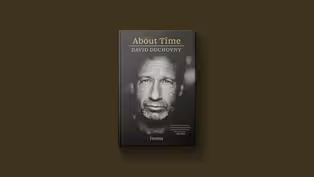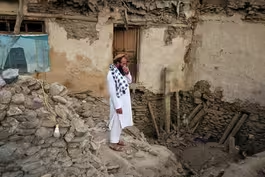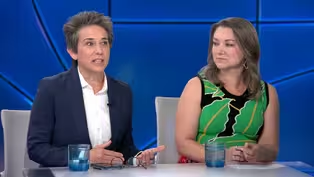
Medical advancements could reshape outlook for Trisomy 18
Clip: 9/1/2025 | 8m 20sVideo has Closed Captions
How medical advancements could reshape the outlook for children with Trisomy 18
Trisomy 18, also known sometimes as Edwards syndrome, is often fatal within weeks after a baby is born. But now, parents and doctors are finding ways of getting more time with those children with greater interventions and incredible commitments. Stephanie Sy discussed the difficult ethical questions around it with Dr. Sheri Fink.
Problems playing video? | Closed Captioning Feedback
Problems playing video? | Closed Captioning Feedback
Major corporate funding for the PBS News Hour is provided by BDO, BNSF, Consumer Cellular, American Cruise Lines, and Raymond James. Funding for the PBS NewsHour Weekend is provided by...

Medical advancements could reshape outlook for Trisomy 18
Clip: 9/1/2025 | 8m 20sVideo has Closed Captions
Trisomy 18, also known sometimes as Edwards syndrome, is often fatal within weeks after a baby is born. But now, parents and doctors are finding ways of getting more time with those children with greater interventions and incredible commitments. Stephanie Sy discussed the difficult ethical questions around it with Dr. Sheri Fink.
Problems playing video? | Closed Captioning Feedback
How to Watch PBS News Hour
PBS News Hour is available to stream on pbs.org and the free PBS App, available on iPhone, Apple TV, Android TV, Android smartphones, Amazon Fire TV, Amazon Fire Tablet, Roku, Samsung Smart TV, and Vizio.
Providing Support for PBS.org
Learn Moreabout PBS online sponsorshipGEOFF BENNETT: Now to the story of a rare genetic condition that is often fatal and the extraordinary efforts by parents and doctors to extend the lives of affected children through intensive interventions.
Alongside those advances come some difficult ethical questions.
Our Stephanie Sy has more.
STEPHANIE SY: It's an agonizing diagnosis for parents and families.
Trisomy 18, also known sometimes as Edwards Syndrome, is often fatal within weeks after a baby is born.
But advances in medicine and research have extended survival in some cases, raising questions about how to approach this rare chromosomal condition in and outside the womb.
Dr. Sheri Fink recently chronicled in The New York Times what happened to a young boy named Noah through the enormous efforts of his mother, Dr. Jacqueline Vidosh, and intense treatment.
Sheri Fink is also the Pulitzer Prize-winning author of "Five Days at Memorial," which is about patient deaths at a New Orleans hospital after Hurricane Katrina.
And she joins me now.
Dr. Fink, thank you so much.
This is a tremendous piece of reporting you did.
And you have been following some of these cases for years.
Tell me, what has changed the outlook for kids born with this disorder?
DR. SHERI FINK, The New York Times: Thank you.
I think it's actually been the families.
For many years, this was considered a diagnosis that was too lethal to treat.
When I went to medical school, that's what we learned.
And these families found each other.
They formed support groups when a child -- they would have a child, a child might survive against the odds.
And with the advent of the Internet and social media, parents who had kids who did survive found each other and started to, in some cases, request the same kinds of treatments that other children would get who didn't have the diagnosis.
Then research was done, and, more and more, there was evidence that accumulated that, in some cases, the medical treatments could extend life.
STEPHANIE SY: I read in your piece that the treatments had initially been providing comfort or even palliative care and that there was a paradigm shift to interventions that could extend kids' lives, sometimes even into adulthood.
And those were existing treatments that were already out there?
DR. SHERI FINK: So, yes, well I think the field of medicine at the start of life, neonatology and the kinds of interventions that children who are, say, born early, that whole field has really developed.
So it's really those types of interventions, support for breathing if a baby is born and has difficulty breathing, interventions like heart surgery on the smallest babies.
So that has evolved over the years.
And I think comfort care very much is still an option for these babies and many of the doctors, even though there has been this paradigm shift in terms of offering families the choice of interventions in some cases depending on the child, but they also feel that comfort care is appropriate, that some families will want to pursue that, will feel that the burdens of treatment, for example, might be too great.
Or because the children do have a lot of medical complexity and they will have many disabilities, the big change in the last few years has been the wider acceptance among the medical community that a disorder that was considered lethal, that was considered not treatable now, to some extent, the idea now is that it was a bit of a self-fulfilling prophecy.
In other words, if a baby is born, has lots of medical needs and doesn't get treatment, then, of course, they will pass away.
And now it's known that in some cases those interventions could actually help the child to live longer, but still with significant medical complexity and disabilities.
STEPHANIE SY: Yes, and you describe this 4-year-old Noah in detail, the deliberations, first of all, that went into it even when Noah was still in his mother's womb.
It was one step at a time.
And there's this part of the piece where you say the mother wanted to see if he was going to be a fighter, but he comes out of the womb and he stops breathing.
So describe that case and what it illustrates.
DR. SHERI FINK: Well, Dr. Vidosh, Jacqueline, she was like any other doctor.
She was an obstetrician and had learned that this was a lethal, fatal diagnosis.
She said that she warned when she received the prenatal -- because this is typically diagnosed with prenatal testing, about 1,000 babies a year in the U.S. And so slowly she had to make decisions about what to do.
She -- when Noah was going to be born, as Jacqueline found a support group called SOFT, the support group for trisomy 13, 18 and associated disorders, found a lot of medical information there, started reading the medical literature, she and her husband decided at the time that they were going to give Noah what any other child who might be born and need some support, they were going to give him a chance to kind of see if he would stabilize, see if he could survive, see if he was a fighter, as they said.
And so they went in initially thinking they wouldn't do any sort of medical interventions to accepting this idea of giving him breathing support when he was born.
And he did respond to it.
But, yes, he would have passed away if he hadn't had that when he was born.
And then there were many other choices that they then faced that resulted from that first choice to give him a chance of survival.
STEPHANIE SY: Dr. Fink, what do you think, after all these years of reporting on this disorder, are your main takeaways and what do you think the main takeaways should be for parents and families that may be looking at this diagnosis?
DR. SHERI FINK: Well, I spent time with children like Noah and other children.
And I think one of the big changes was also research into the families themselves.
I think there's often an assumption that, if a child is severely disabled, cognitively disabled, in this case, most of these children or almost all of them are nonverbal, that these deep questions of what is a worthwhile life or is that child happy, for example.
And what is incredible about these kids is that their families talk about them as being a very happy disposition, that they communicate, that they engage.
So, whereas they might not have the words that we have, they might -- they still can meet developmental milestones.
They laugh.
They hug their families.
It sounds like such a scary diagnosis, something so profound that could affect the child's health and their ability to develop.
But, in fact, there's something so beautiful about the devotion of the families that do decide to try to offer their children the best chance of surviving.
And, also, I think we really need to respect families who say that this doesn't meet their values or that they feel like, in their child's case, that that wouldn't be the right choice to choose heart surgery, for example, to repair the heart or to choose a ventilator, a tracheostomy.
So, to me, it really comes down to speaking to different families who've made different choices and understanding and empathizing with all of them and also just being blown away and impressed by the love that all of these families that are faced with a diagnosis that is unexpected and, of course, very, very difficult, that they go on and can have amazing lives when they're offered choices.
So that is my big takeaway.
STEPHANIE SY: Thank you so much.
That is Dr. Sheri Fink joining us.
50 years after 'Jaws,' researcher dispels myths about sharks
Video has Closed Captions
Clip: 9/1/2025 | 6m 42s | 50 years after 'Jaws,' researcher dispels myths about sharks (6m 42s)
Court blocks deportation flights of unaccompanied minors
Video has Closed Captions
Clip: 9/1/2025 | 6m 31s | Court blocks deportation flights of unaccompanied minors to Guatemala (6m 31s)
David Duchovny on poetry influenced by his life and career
Video has Closed Captions
Clip: 9/1/2025 | 6m 56s | David Duchovny on his new book of poetry influenced by his life and career (6m 56s)
Devastating earthquake strikes Afghanistan, deepening crisis
Video has Closed Captions
Clip: 9/1/2025 | 3m 59s | Devastating earthquake strikes Afghanistan, deepening humanitarian crisis (3m 59s)
News Wrap: China welcomes allies to annual security summit
Video has Closed Captions
Clip: 9/1/2025 | 6m 16s | News Wrap: China welcomes closest allies to annual security summit (6m 16s)
Photojournalist documents arrests at immigration hearings
Video has Closed Captions
Clip: 9/1/2025 | 4m 45s | Photojournalist documents arrests outside of immigration hearings (4m 45s)
Tamara Keith and Amy Walter on Trump's Chicago threats
Video has Closed Captions
Clip: 9/1/2025 | 8m 50s | Tamara Keith and Amy Walter on Trump's threats of a Chicago takeover (8m 50s)
Providing Support for PBS.org
Learn Moreabout PBS online sponsorshipSupport for PBS provided by:
Major corporate funding for the PBS News Hour is provided by BDO, BNSF, Consumer Cellular, American Cruise Lines, and Raymond James. Funding for the PBS NewsHour Weekend is provided by...


















